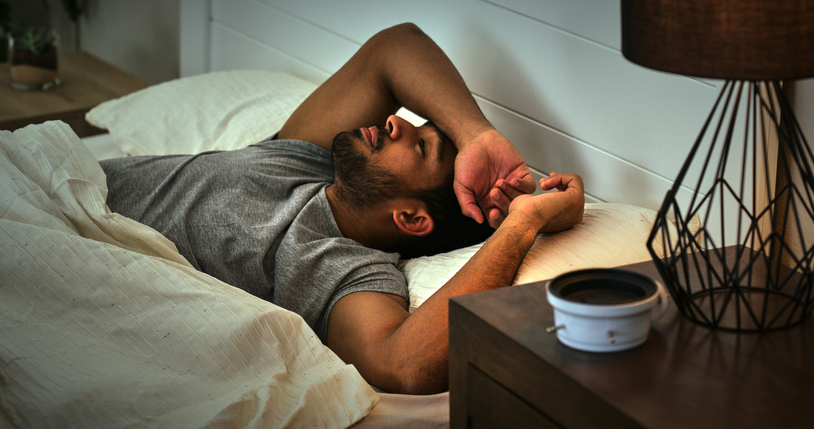While society’s slowly getting better at discussing mental health, many men still treat vulnerability like it’s taboo. Instead of admitting they’re struggling, they often develop elaborate camouflage systems that mask their stress and anxiety. Here’s how to recognize when the men in your life are carrying more than they can handle—even when they’re insisting everything’s “fine.”
1. They’re Obsessed With Productivity

When men can’t control their anxiety, they often shift focus to things they can control. That spotless garage, the meticulously organized tool shed, or the sudden interest in alphabetizing their supplements aren’t about efficiency—it’s about creating the illusion of control when their inner world feels chaotic. Watch for the difference between productive and compulsive. One builds while the other numbs.
2. They Get Irrationally Angry

What looks like inexplicable irritability often masks deeper anxiety. Small inconveniences trigger disproportionate reactions—a stuck drawer becomes a reason for a five-minute rant or a slow internet connection sparks an explosion. This isn’t about anger management, it’s about anxiety wearing a more socially acceptable mask. In a world where many men feel it’s more acceptable to be angry than anxious, rage becomes their emotional default setting.
3. They Have Tons of Physical Symptoms

They’ll talk endlessly about physical symptoms while dodging emotional causes. Headaches, back pain, stomach issues—these become safe topics that don’t threaten their masculine identity. Listen for the man who can detail every muscle twinge but claims he “doesn’t get stressed.” Their bodies are telling you the truth that their words won’t acknowledge.
4. They Switch Up Their Intensity

Their usual activities suddenly kick into overdrive. The casual runner is now training for ultramarathons. The weekend golfer is obsessing over their swing for hours daily. The social drinker is having a few more each night. This intensification isn’t about passion or dedication—it’s about drowning out the mental noise with physical exhaustion or chemical numbing.
5. They Use Humor As a Shield

They’re cracking more jokes than usual, especially self-deprecating ones. Humor becomes their social armor, deflecting genuine concern with punchlines. Pay attention to the timing—if they’re making jokes when the conversation turns serious or personal, they’re likely using humor as a defense mechanism. The class clown routines are all because they want to keep emotional discussions at arm’s length.
6. They Heavily Rely On Data

They intellectualize everything, turning emotions into problems to be solved with spreadsheets and research. Feeling overwhelmed at work becomes a 20-tab analysis of productivity techniques. Relationship stress transforms into a deep dive into psychological theories. This isn’t about being informed—it’s about staying safely in their head when their heart is struggling.
7. They Transform Physically

They suddenly become hyper-focused on their appearance or physical health. While self-improvement can be positive, watch for obsessive patterns. When anxiety can’t be controlled internally, many men shift that energy to controlling their external appearance. That new extreme diet or intense workout regime might be less about health and more about creating a sense of mastery over something tangible.
8. They Shut Down Socially

Their usual social patterns start to shift. Maybe they’re skipping regular meetups with friends, or their responses to messages become delayed and minimal. Men often withdraw when overwhelmed, but they’ll rarely admit that’s what’s happening. Instead, they’ll have perfectly logical explanations about being busy or tired. Watch for the pattern, not the individual instances.
9. They Shift Their Sleep Routines

Their sleep patterns change noticeably, but they’ll attribute it to everything except stress. They’re up late “catching up on work” or “just not tired.” Early morning wake-ups become about “maximizing productivity” rather than acknowledging racing thoughts. Sleep disturbance is often one of the first physical manifestations of anxiety that men can’t entirely mask.
10. They Experience Decision Paralysis

Simple choices become unnecessarily complicated. The normally decisive man who now needs to research every option for a basic purchase isn’t being thorough—he’s trying to control mounting anxiety through over-analysis. When the internal world feels chaotic, external decisions become overwhelming.
11. They Escape In Their Technology

Screen time increases dramatically as devices become emotional escape hatches. Whether it’s endless scrolling, gaming marathons, or constant phone checking, technology provides a socially acceptable way to check out mentally. This isn’t about being entertained, it’s about finding a culturally approved way to dissociate.
12. They’re Compulsive About Being Competent

They become increasingly fixated on proving their capability in various areas of life. This might manifest as taking on unnecessary responsibilities, refusing help, or becoming defensive about their abilities. The need to appear competent becomes a shield against feeling vulnerable. Watch for the man who’d rather struggle alone than ask for directions—literally or metaphorically.
13. They Have Gaps In Their Memories

Their usually reliable memory starts showing unexpected holes. They forget conversations, miss appointments, or lose track of commitments. While this might look like carelessness, it’s often the result of an overwhelmed mind trying to process too much internal stress while maintaining a facade of normalcy.
14. They Seem Restless

They can’t seem to stay still, but it’s more than simple fidgeting. Watch for constant movement—pacing while on phone calls, inability to sit through a movie, or newfound habits like nail-biting or leg bouncing. Their bodies are processing the anxiety and it’s coming out in pretty obvious ways.
15. They’re Rigid About Their Routines

They become increasingly inflexible about their routines and habits. While structure can be healthy, watch for when it becomes a coping mechanism. The man who becomes disproportionately disturbed by minor schedule changes or deviation from their normal patterns might be using routine as a way to maintain a sense of control when they’re feeling overwhelmed.








